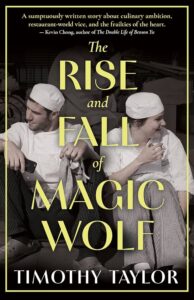Restaurant gods, clay feet
The Rise and Fall of Magic Wolf
by Timothy Taylor
Toronto: Dundurn Press, 2024
$26.99 / 9781459753198
Reviewed by Greg Brown
*

In his new novel, The Rise and Fall of Magic Wolf, Vancouver author Timothy Taylor returns to familiar territory: the professional kitchen. Since the publication of his acclaimed debut novel, Stanley Park, Taylor has spent twenty-plus years writing about the art and business of food, and about the devotion of those who make food their life’s work.
As ever, Taylor’s attuned to the essential drama of life in restaurants—the long hours, the sacrifice, the intense relationships, the everlasting war between commerce and creativity.
But in this latest book he adds a few new ingredients, including the disappointments of middle age and a pointed (if puzzling) reckoning with how powerful men abuse their authority. It’s a complex dish.
The novel follows the rise of Teo, a young chef who returns to Vancouver to make it as a restaurateur after a fraught apprenticeship in Paris. Teo becomes a minor partner in Magic Wolf, a food venture founded by Magnus, a childhood friend and financial wunderkind with eyes on global expansion. Magic Wolf’s first project—the successful Rue Véron in downtown Vancouver—is a smash hit and begets a second resto and then a third. As their empire gathers steam, their fame invites increasingly unsympathetic attention from food bloggers complaining about the unsavoury appropriation of recipes from the developing world. (Sentimental Teo tried to model the menu of Orinoco, Magic Wolf’s second restaurant, on his father’s postwar nomadic tour of Latin America.)
But things really come to a head when Rue Véron’s charismatic star chef, Frankie Coté, is accused in the media of grotesque sexual abuses.
Firing the celebrity face of their growing enterprise should be easy, except that Teo and Frankie are friends. Or something like friends. They share a complicated past extending to Teo’s apprenticeship in Paris in the ‘90s. Back then, Frankie was Teo’s mentor, the first chef to take a chance on Teo’s unproven talent, and the centre of Teo’s universe. In the novel’s retrospective first-person narration, Teo recalls Frankie as a handsome, charming, force of nature—a principled culinary artist “zealously committed to his cuisine” and as the life of the endless late-night parties that followed gruelling dinner services. A gross understatement is to say that impressionable Teo admires Frankie. As Teo’s sister points, “You wanted to be him.” And so Teo tries to be him, taking on his mentor’s dedication in the kitchen, helping Frankie prepare his extravagant meals at his home, and falling in love with Stephanie, another cook and Frankie’s ex-girlfriend.
So, when the news of the accusations against Frankie breaks, including a story about a violent assault on an underage waitress, Teo is torn about what to do and left questioning whether he was naïve or even willfully blind to his beloved mentor’s behaviour. How much did he refuse to see? Were there any signs? There’s the question, too, of whether Teo’s even in a position to judge his fallen mentor. Teo’s no saint. Middle-aged now, he’s beset by his own regrets, including an affair with his sous chef that’s at risk of becoming a scandal of its own and destroying his marriage with Stephanie, now the famous author of two memoirs about her experience surviving sexism in French kitchens.
What makes the novel’s reckoning with these men behaving badly particularly compelling is that it emerges unexpectedly out of a much less thorny coming-of-age story, like a Trojan horse or a turducken française. The first third of the novel, set in Paris, is a story of artistic apprenticeship, a künstlerroman about Teo’s education in the art of haute cuisine in the fiery pits of a serious French kitchen. It’s even trope-ish. As one might expect, there are lavish descriptions of food and pages of exquisite narration about its preparation. (Taylor’s never better than when he’s writing about food, though his eye for crisp detail and knack for muscular prose can be summoned for any descriptive occasion.)
And just like in an episode of Hell’s Kitchen or The Bear, Teo and his fellow kitchen minions endure streams of foul-mouthed invective from their bosses, and even the occasional rolling pin used as a cudgel, though never from patient Frankie. It’s a self-aggrandizing, even romantic, vision of the artist passing through the consecrating fire, and a mainstay of fiction about professional kitchens. And just what you’d expect from a story about a young cook becoming—or trying to become—a great artist.

Thankfully, Taylor’s novel isn’t about the success of youth. It’s about the decline of middle age, and artistic compromise, and finally about the moral weight of bad decisions.
None of the characters can escape the worlds they’ve set in motion. Teo’s fate, as a sellout and the avatar of corporate greed and cultural appropriation, is sealed the moment he decides to join forces with Magnus’s corporate interest, just as his marriage is doomed the moment he enters the wrong hotel room.
Meanwhile, between Paris and Vancouver, the hard-partying Frankie gets sober in the culinary wilderness of Trois-Pistoles, slinging meatball subs at a bowling alley. But transplanted to Vancouver, his star quickly rising, he can’t escape his old self. Sober now, but still carousing. Hitting on wait staff, cheating on his wife, setting in motion his own downfall. It’s a considerate, multifaceted portrait of two men, one that highlights their humanity while still holding them to account.
But the heart of the third act is the question of Frankie’s innocence. Did he strangle and sexually abuse an underage waitress from back in his Paris days? Or is he the victim of malicious press? Or a poisonous rumour drummed up by a jealous colleague? It really matters, because the crux of the novel’s moral argument rests on whether Frankie is a bad man getting caught and rightfully punished or a flawed but ultimately decent man being unfairly destroyed by a story blown out of proportion.
The question of Frankie’s innocence feels especially urgent to settle because the novel’s obviously in conversation with the ongoing cultural and legal reckoning happening with men who’ve abused their offices and privileges. I won’t spoil the ending here, except to say that the novel will disappoint some readers and enrage others. It’s a muddled, unsatisfying ending for Frankie. Undercooked in the middle and burnt on the edges. As for Teo—the Nick to Frankie’s Gatsby—he’s given an improbably hopeful sendoff. It’s a touch too sweet for a novel that’s otherwise a rich, sophisticated meal.

*

Gregory Brown is a writer and teacher from Nanaimo, BC. His work has appeared in Pulp Literature, PRISM International, Best Microfiction, The Journey Prize 30: The Best of Canada’s New Writers, and elsewhere. He’s taught at the University of Virginia’s Young Writers Workshop, the Creative Writing for Children Society in Vancouver, and Literacy Central Vancouver Island. [Editor’s note: Gregory recently reviewed Polly Horvath and Sarah Suk for BCR.]
*
The British Columbia Review
Interim Editors, 2023-25: Trevor Marc Hughes (non-fiction), Brett Josef Grubisic (fiction and poetry)
Publisher: Richard Mackie
Formerly The Ormsby Review, The British Columbia Review is an online book review and journal service for BC writers and readers. The Advisory Board now consists of Jean Barman, Wade Davis, Robin Fisher, Barry Gough, Hugh Johnston, Kathy Mezei, Patricia Roy, and Graeme Wynn. Provincial Government Patron (since September 2018): Creative BC. Honorary Patron: Yosef Wosk. Scholarly Patron: SFU Graduate Liberal Studies. The British Columbia Review was founded in 2016 by Richard Mackie and Alan Twigg.
“Only connect.” – E.M. Forster